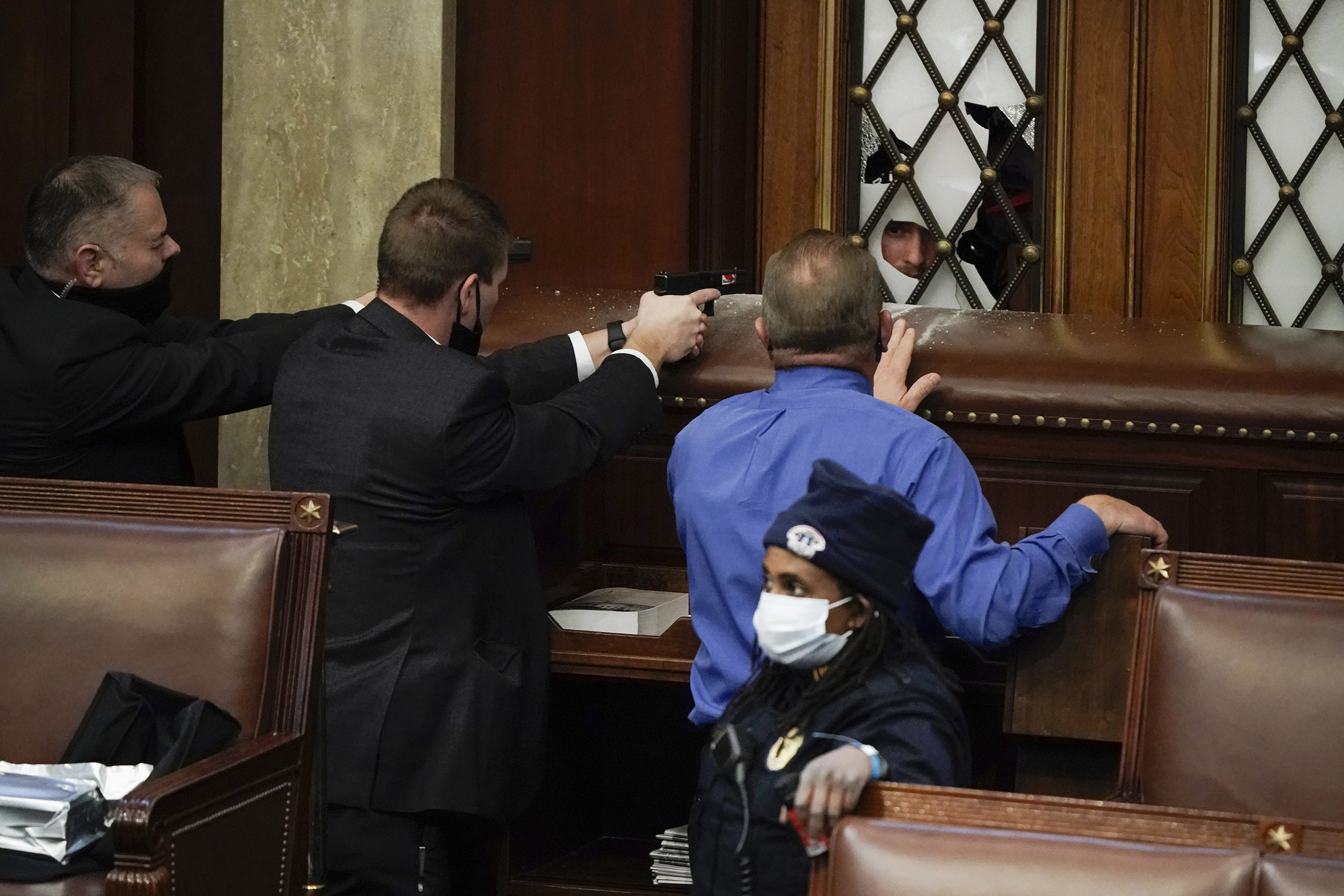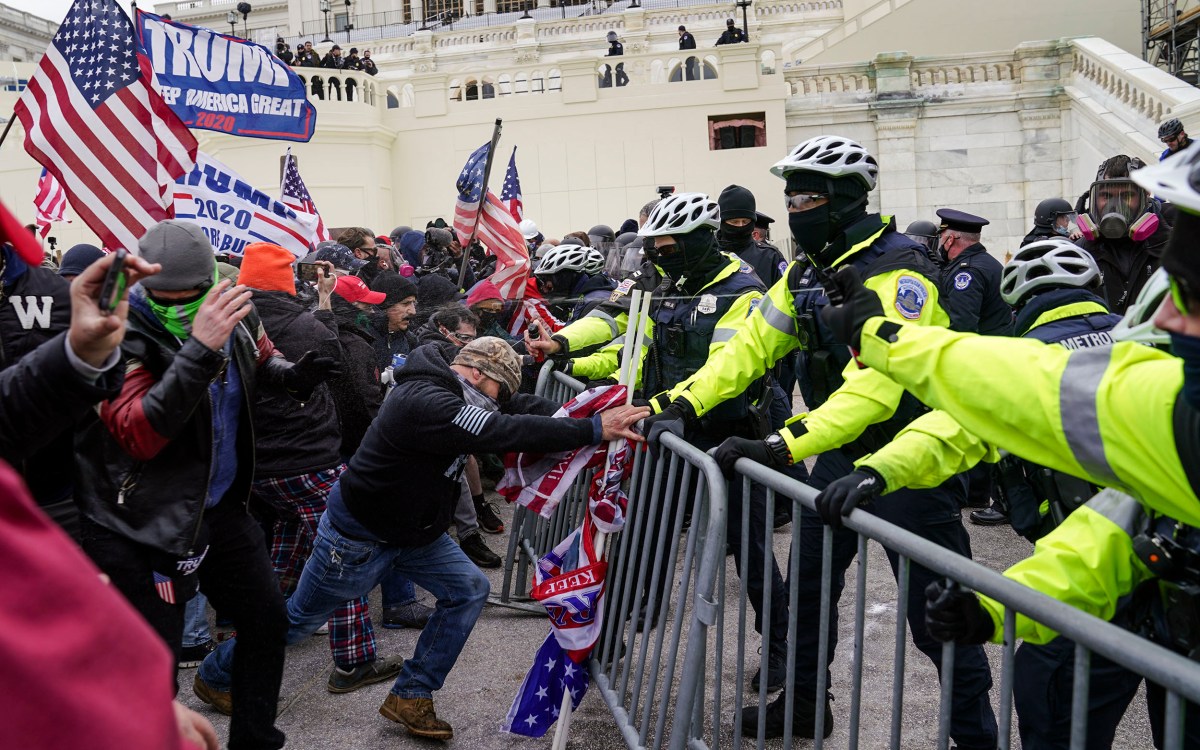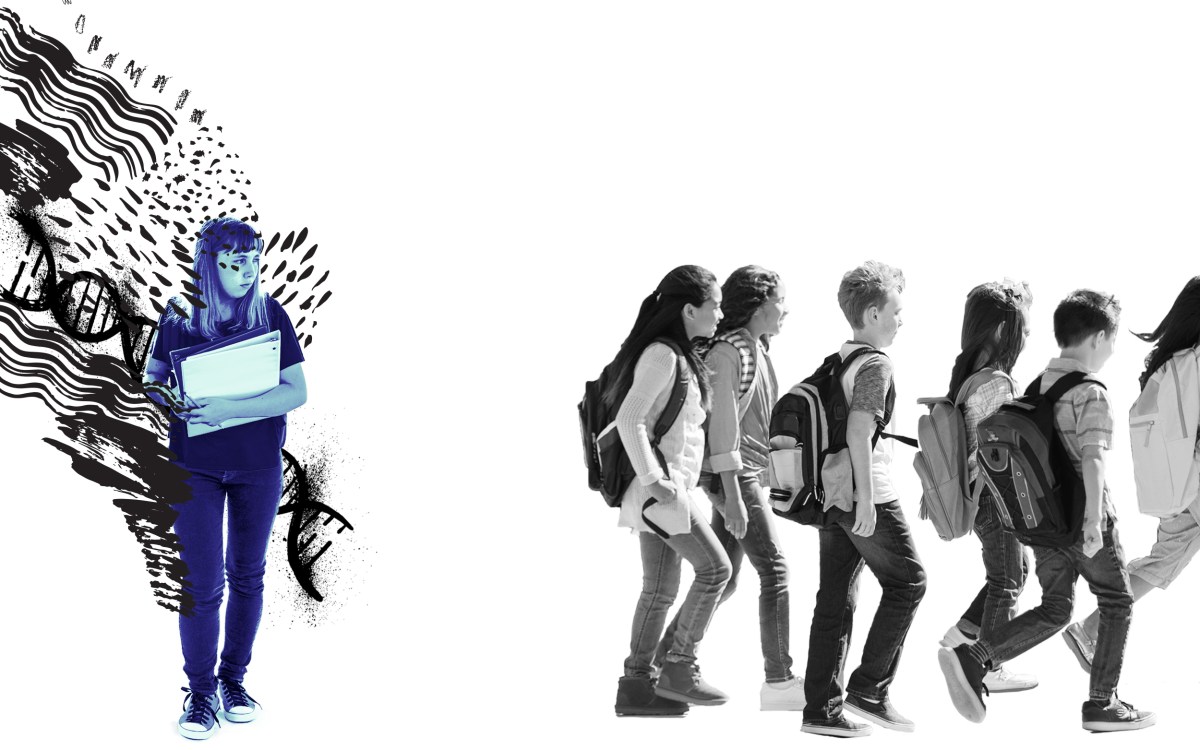
Police with guns drawn watch as rioters try to break into the House Chamber at the U.S. Capitol on Jan. 6.
AP Photo/J. Scott Applewhite
How to talk to your kids about the Capitol riots
Psychologist suggests starting with asking them what they think, feel
The searing pictures of a weapon-wielding, pro-Trump mob storming the Capitol just over a week ago have been difficult for many adults to process. But for children, making sense of the violent images that have flooded the airwaves and social media in the days since the attack on that symbol of American democracy can be particularly challenging. Open and honest discussions are keys to helping children understand the events of last week said Richard Weissbourd, co-director of Making Caring Common at the Harvard Graduate School of Education (HGSE), an initiative focused on moral development priorities in child-raising. The Gazette spoke to Weissbourd, a psychologist and senior lecturer at HGSE, about ways to navigate the difficult topic with children of all ages.
Q&A
Richard Weissbourd
GAZETTE: How can parents best start conversations about what happened last week?
WEISSBOURD: I think that the place to start with kids is to ask questions like, “What have you heard? What are you thinking? What are you feeling?” It’s also important not to conflate how you might be thinking and feeling with their questions. Doing the work of understanding how you think and feel about this before entering in these conversations can be helpful too in guiding your kids. Also, many kids are going to feel unsafe. This was the temple of democracy, and it was supposed to be one of the most secure buildings in the country, and it was overrun by a mob. So young kids, in particular, might worry, “Is any place safe? Is my home safe?” So reassurances about security, finding out how children are making meaning of it, and being nimble enough to respond to them in ways that are really tuned in to how they feel, are all going to be important for parents in these discussions.
I think a lot of kids also don’t want to be passive. They want to be active; they want to do something. This is a time when a lot of people are feeling very out of control, and so giving them something they can do that can help them feel some control or help them manage their feelings about this is helpful, whether that’s writing a congressperson or working on voter registration in your local community. For older kids, this is also a great time to talk about democracy, to explain that we are engaged in this brave and beautiful experiment in democracy, but that there’s nothing indestructible about it. We have to recommit to it every generation, and we really have to work to support it and those institutions that protect it.
“I think it’s important to talk to kids about not demonizing the other side and engaging in wild stereotypes …” said Richard Weissbourd, a psychologist and senior lecturer at the HGSE.
Stephanie Mitchell/Harvard file photo

GAZETTE: How do you start a productive dialogue when children may have conflicting views of what they have seen, or have been told different things by parents or other adults and caregivers?
WEISSBOURD: I think it’s important to talk to kids about not demonizing the other side and engaging in wild stereotypes about the other side — the narrative that all Republicans are this, all Democrats are this. It’s important for children to understand that these large groups of people are motivated by many different things. I don’t mean those who were rioting. I mean the parties. It’s also a time to talk to older kids in particular about our information bubbles, and how, in many respects, we have lost a shared reality. People are hearing very different kinds of news and that means in many cases they have a different set of facts, a different reality they’re operating under.
There is also this issue of critical thinking and being able to disentangle facts from fiction. There’s a need for a conversation with kids about what constitutes an accurate news source and the importance of the truth and how truth is the basis of trust in our democracy. I think this is a great opportunity to talk about that and also to be a co-investigator with kids, to do research together to determine what the truth is if it’s unclear.
GAZETTE: Can history be a guide to some of these conversations?
WEISSBOURD: I think history is also important in understanding the political divide. This is not the first time our country has been deeply divided. There have been brawls in Congress; there’s been a Civil War; there’ve been times in our history when the electoral system broke down. Bringing in the historical context is important in part to help kids realize that we have prevailed in the past but that there is so much injustice that still needs to be overcome.
GAZETTE: People have pointed out that the Black Lives Matter protesters were treated much differently than those who violently attacked the Capitol. How can adults address that in their conversations with kids?
WEISSBOURD: This is a crucial opportunity to talk about race and racism, and to point out that with the Black Lives Matter protesters, there was much more security at the Capitol and to discuss that. It’s an opportunity to talk about how racism is embedded in systems and in our culture, about the importance of being alert to it and the importance of challenging it in both systems and in ourselves. Many young people are very attuned to these issues, and young people and adults can learn a lot from these conversations. Understanding the history of racism in this country is vital context for these discussions.
GAZETTE: Is there an age that is too young to discuss these types of topics?
WEISSBOURD: When kids are 3, 4, 5 years old, and younger, obviously, I don’t think you need to raise the topic, but that doesn’t mean that they might not have questions about it. They may bring it up because they may have heard something about it from an older sibling, from a friend, or seen something on TV. So there’s reason to be prepared to talk to younger kids about it. For older kids, I think mentioning it to them and trying to unearth how they’re thinking and feeling about it is important and being guided by them in terms of the kinds of questions they have. Sociologist Aaron Antonovsky talks about the need to make trauma comprehensible, manageable, and meaningful. This is a national trauma, and so all of us, children and parents included, need to wrap our minds around this and make sense of it in some way and make sense in a way that allows us to go forward constructively.
GAZETTE: How can teachers approach these conversations?
WEISSBOURD: Almost everything I said applies to schools. I think that principals have very tough decisions to make about this, because there are some parents who don’t want politics discussed in schools at all. And they particularly don’t want anything that smells like indoctrination. And so part of this has to be an examination of what is core to our mission in educating students. Understanding the truth and why it’s important is at the heart of education and at the heart of preparing young people to be engaged citizens. There are some political issues that educators may want to stay away from in schools because they’re very divisive; they’re hard to resolve; and parents have very strong feelings about them. But when a major event like this happens that reverberates throughout the country and that has such strong implications for your core purpose as a school, it seems to me you’ve got to talk about it.






